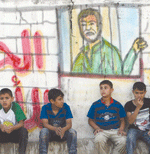
|
| Palestinian boys sit in front of a mural depicting a Palestinian prisoner in an Israeli jail, during a summer camp organized by the Hamas movement in Gaza City June 17, 2010. REUTERS/Mohammed Salem |
RAMALLAH (IPS) — Under intense international pressure Israel declared last week that it would ease its crippling blockade on Gaza by permitting an additional but limited number of daily items, including food, into the coastal enclave. Following Israel’s deadly assault on the Free Gaza (FG) flotilla several weeks ago in international waters, during which nine activists were shot dead and dozens wounded, as the flotilla tried to deliver desperately needed humanitarian aid to the besieged strip, Israeli authorities came under enormous pressure to lift the blockade. Israel finally relented after it was informed that in exchange for a slight easing of the closure the international community would accept Israel establishing its own investigation into the raid, not an independent one as initially demanded. Two international observers, however, will be permitted to monitor the investigation. But the inquiry has already been written off as a whitewash by critics who demanded a more credible one. One of the observers is David Trimble, a former leader of the right-wing Ulster Unionist Party and former first minister of Northern Ireland. Trimble is also a life peer of Britain’s Conservative Party. On the day of Israel’s bloody flotilla raid Trimble established the Israeli advocacy group Friends of Israel. However, the easing of the siege has yet to materialize, and if and when it does it will not address the underlying issues which have reduced Gaza’s 1.5 million, mostly civilians, to abject poverty and turned the enclave into a humanitarian basket-case. “Permitting mayonnaise and potato chips [two of the items Israel is now considering allowing] into Gaza is really irrelevant in dealing with the root causes of the crisis,” says Maxwell Gaylard, U.N. Deputy Special and Humanitarian Coordinator for the Middle East. “What we need to see is an improvement in Gaza’s water, sanitation, power grid, educational and health sectors. Gaza’s economy is shot to pieces and its infrastructure is extremely fragile. Something dramatic has to happen soon if Gaza is to be seriously rehabilitated,” Gaylard told IPS. Currently approximately 80 items are now allowed into Gaza. A year ago only 40 items were permitted entry. Prior to June 2007, when Hamas took control of Gaza, 4,000 types of goods were allowed in per month on about 10,400 trucks. Now only 2,500 trucks are allowed in monthly. Israel argues that the siege is for security reasons. But following a lawsuit by Israeli human rights organization, Gisha, the Israeli government was forced to acknowledge that the siege was a political move. “A country has the right to decide that it chooses not to engage in economic relations or to give economic assistance to the other party to the conflict, or that it wishes to operate using ‘economic warfare’,’’ the government said. The International Committee of the Red Cross (ICRC), however, says the siege on Gaza is a violation of international law in that it is a form of collective punishment against civilians. Cecelia Goin from the Red Cross in Jerusalem says that any easing of the blockade is a step in the right direction but there are bigger issues at stake. “The only way that Gazans will be able to rebuild their lives and livelihoods is for the siege to be lifted completely,” Goin told IPS. “There is currently on average seven hours of power cuts daily. The power cuts pose a serious risk to the treatment of patients – and to their very lives. “It takes two to three minutes for a generator to begin operating, and during that time electronic devices do not function. As a result, artificial respirators must be reactivated manually, dialysis treatment is disrupted and surgery is suspended as operating theatres are plunged into darkness,” says the ICRC. “Additionally, it took us five months to get permission to bring in a mammograph for Shifa Hospital, Gaza’s main hospital. It took another five months before the Israelis would allow in a dialysis machine, and it took us eight months to bring in spare parts for ambulances,” Goin told IPS. “There is a shortage of essential medicines such as anti-epileptic drugs, and a shortage of medical equipment such as ventilator tubes. More than 110 of the 700 disposable items that should be available are also out of stock. The health situation is critical.” For Palestinians in the West Bank life is obviously much better but Israel’s continued occupation of the territory also damages the fabric of life there. “Palestinian movement there has improved with Israel’s reduction of checkpoints and roadblocks. But there is still a problem for Palestinians moving from the northern West Bank to the south as the territory is effectively divided into cantons,” Gaylard told IPS. “There has also been some improvement in the West Bank’s economy due to fiscal stimulus, limited investment and the payment of salaries on a regular basis. But this needs to be made sustainable by Palestinians being able to access their productive assets such as farmland,” added Gaylard. Israel’s separation barrier has divided farmers from their agricultural fields and confiscated large swathes of Palestinian land for illegal settlement development and “security.” “The lack of an equitable distribution of water is another issue with Israelis getting the bulk of the area’s water supplies and Palestinians having to survive on the remainder,” said Gaylard. West Bankers also have access to plentiful petrol and the limited water they have is fit for consumption unlike Gazans whose underground water resources have been polluted by sewage, pesticides, chemicals and sea water.






Leave a Reply